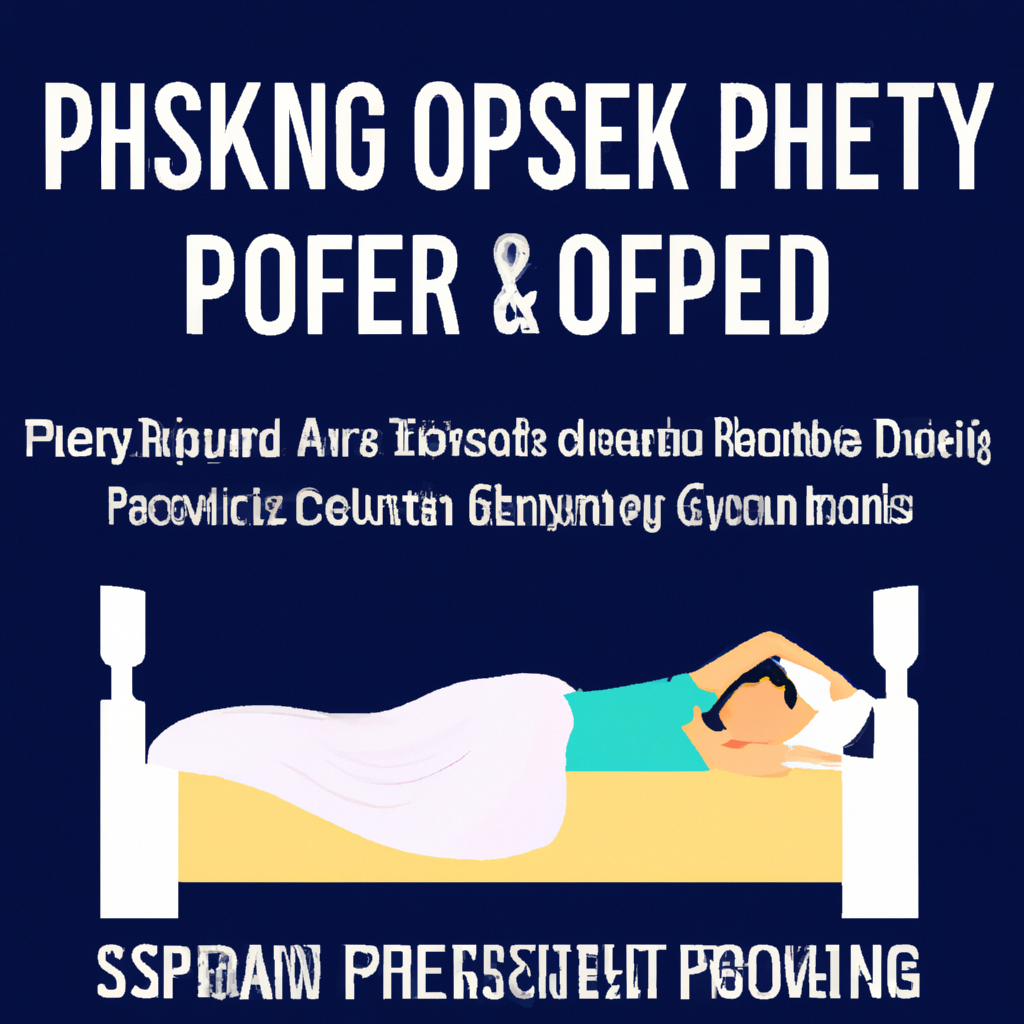Getting an adequate amount of quality sleep every night is essential. It doesn’t just help us feel refreshed and energized in the morning, it also aids physical recovery and helps us stay healthy. If used effectively, sleep can be an incredibly powerful tool for improving our physical wellbeing. In this article, we look at the various ways that we can optimize our sleep in order to maximize physical recovery.
1. Embracing the Healing Power: Unraveling the Secrets of Sleep for Optimal Physical Recovery
Sleep is an often overlooked but powerful ally for optimizing physical recovery. It helps the body and mind to repair and restore itself on a cellular level. But how can we maximize its full potential and harness its hidden power? Here are a few key secrets to get the most out of restorative sleep.
- Nutrition
Eating a healthy and well-rounded diet will give your body the nutrients it needs to fuel the recovery process. Eating before bed is not recommended as it can impair sleep quality. Avoid drinks with caffeine late in the day and don’t go to bed with an empty stomach. Eating plenty of healthy fats and fish, such as salmon, helps to boost quality sleep. - Exercise
Regular exercise can aid quality sleep by helping to enhance the length and restorative power of sleep. This is particularly helpful when coupled with scheduled stress relief activities, such as yoga and meditation. - Wind Down
Often forgotten, the hour or two before heading to bed can prove crucial for allowing the mind and body to transition into a restful state. Establishing a regular routine before bedtime can help prepare the body for sleep. This could include increasing the room temperature, sipping herbal tea, stretching, reading, or listening to soothing music. - Stick to a Schedule
Try to stick to a consistent sleep and wake schedule regardless of the day of the week. Going to bed and waking up at roughly the same time each day helps to entrain the body’s clock and will help improve the quality of sleep.
Environmental Factors
Certain environmental factors, such as keeping the bedroom cool, dark, and quiet, may help to maximize the healing effects of sleep. The use of blackout curtains or an eye mask can help to block out light, as can wearing ear plugs or using a noise canceling machine. Monitoring and limiting overexposure to blue light from technology, such as phones and laptops, may also help encourage restful sleep.
Supplements
In some situations, it may be useful to consider supplementing with certain herbs and vitamins to enhance the restorative effects of sleep. Calcium and magnesium have been shown to help improve sleep quality, while melatonin is a hormone that helps regulate sleep. Valerian root, skullcap, chamomile, and passionflower are just some of the herbs often used to help quiet the mind and soothe the body. It is important to research and talk to a health professional before taking anything.
As with anything, everyone is unique and so the recovery process may vary. However, understanding the power of proper sleep and tapping into its healing capacity can help to drastically improve recovery time and increase resistance to illness and injury.
2. Unlocking the Restorative Potential: Maximizing Sleep to Fuel Your Body’s Healing Process
Sleep is essential for our physical and mental health, and it can go a long way in restoring us when we are feeling worn down.
Establish a Regular Sleep Routine
Creating a sleep routine is key to unlocking the restorative potential. When your body gets used to the routine, it will go into a restorative mode. For adults, the ideal amount of sleep is 7 to 9 hours per night. To create a regular sleep routine, avoid screens before bed, establish a consistent time for going to bed, and limit any naps to no more than thirty minutes.
Exercise Regularly
Physical activity plays a critical role in sleep. A regular exercise routine will regulate sleep-promoting hormones that help reset your circadian rhythm. Strive for at least 20 minutes of activity each day, with some rest days incorporated if necessary. This may include a brisk walk or light jog, a light yoga session, or just exploring a park nearby.
Avoid Stimulants
Caffeine and alcohol are known to interfere with our sleep patterns. Avoiding caffeine and alcohol at least four hours before bed can help maximize restorative sleep. If you need an after-dinner boost, opt for a herbal tea such as chamomile or peppermint.
Eat a Healthy Diet
Eating foods high in carbs, proteins, and fats can help promote quality sleep. Eating lighter meals and avoiding large portions close to bedtime will also help. Additionally, try to avoid large meals and snacks too close to bedtime to maximize the benefits of restorative sleep.
Reduce Stress
Reducing stress can help to improve your quality of sleep. If you don’t already have one, consider implementing a nightly relaxing routine such as journaling, taking a relaxing bath, or reading a book away from screens. Mindful meditation can also be a great way to calm the body and reduce stress levels. Finally, getting enough sunlight during the day will help to regulate your melatonin levels while reducing stress.
3. A Good Night’s Sleep: The Ultimate Game-Changer for Athletic Performance and Physical Renewal
For athletes, getting a good night’s sleep is easily one of the most important contributors to peak performance. Without a full rest, the body cannot reenergize and rebuild, and can’t reach its true athletic potential. Here’s why sleep is such a game-changer for athletes and how to be sure to get the restful shut-eye that you need:
- It Replenishes Your Energy: Athletes require bursts of energy to compete at their best, and sleep is key for creating that energy. During sleep, your body has more time to recharge and restore depleted energy stores. This is critical for better athletic performance tomorrow.
- It Builds Muscle & Strengthens Your Immune System: Many athletes also don’t realize that sleep can help build muscle. During sleep, your body has ample opportunity to repair, rebuild, and rejuvenate, and that includes your muscle tissue, which helps increase strength and performance. In addition to improved physical performance, a good night’s sleep boosts your immune system, allowing you to stay fit and avoid colds and viral infections.
- It Helps Regulate Your Appetite: Research shows that a lack of sleep affects our hormones and can lead to weight gain. An adequate amount of sleep prevents hormonal disturbances, reduces feelings of hunger and appetite, avoids overeating and encourages a healthier lifestyle.
Although everyone enjoys crashing after a long practice or training session, sleep is the critical missing piece of the puzzle. Prioritizing bedtime is essential to boosting performance and helping the body recover and heal. And, good night’s sleep can also help you stay motivated and refreshed, so that you’re always focused when it comes time to perform.
Tracking hours of powerful sleep can be highly beneficial for an athlete’s training. By knowing when their body needs additional rest or recuperation, they can have ultimate control over peak performance levels.
In the end, a good night’s rest is the ultimate key to athletic success. And, by tracking your rest and making it a priority, you can significantly boost your performance and physical resilience.
4. Sleep as the Ultimate Recovery Elixir: Cracking the Code for Unleashing Your Body’s Full Potential
Humans owe much of their success to sleep. From the improved cognitive function to strengthened immune system, the benefits of sleep are far-reaching both inside and outside the body. But the most potent impact of sleep lies in its ability to recharge our bodies and minds.
Deep, regenerative sleep cycles are a key to long-term athletic success. Knowing when and how to use sleep as a recovery tool is just as important as implementing a comprehensive exercise plan. As athletes and coaches seek for new methods of improving performance, the impact of sleep on physical recovers deserves close attention.
The secret of unlocking its full potential lies in understanding the science behind the different sleep stages. During the night, the body go through cycles composed of four stages:
- Stage 1: Light Sleep
- Stage 2: Deeper Sleep
- Stage 3 & 4: “Delta” Sleep
- Stage 5: Rapid Eye Movement (REM)
These four stages make up a healing cycle that helps restore our energy and repair any damage our bodies have endured over the day. During the fourth and fifth stages of sleep, the body fully relaxes and increases production of hormones such as growth hormone, which rebuilds and repairs cells, allowing us to feel energized in the morning.
Without sufficient deep sleep, our bodies can suffer from hunger, sluggishness, impaired concentration, and other adverse symptoms. That’s why it’s essential to understand the science of sleep and create a beneficial sleep-recovery routine to unleash our full potential.
Sleep is truly a wonder drug when it comes to physical recovery. Taking the time to optimize your sleep habits can make all the difference in your recovery time and overall wellbeing. So why not take control of your sleep and reap all the healing benefits that come with it? Good night, and happy recovering!



